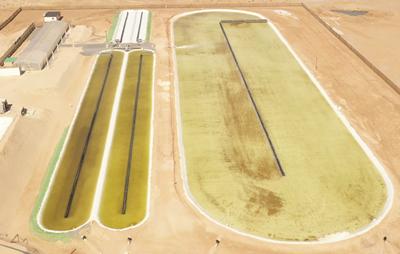Hydrodynamics of algae cultivation examined to transform food, biofuel and cosmetics

Researchers from the University of Southampton are helping optimise the mass production of algae that could provide a more sustainable source of protein and fatty acids to meet the growing world demand.
Hydrodynamics experts in Civil, Maritime and Environmental Engineering are collaborating with UK-based SuSeWi Ltd to maximise productivity and reduce energy costs in the next generation of algae raceway ponds.
A research team, led by Principal Investigator Dr Gustavo de Almeida, will combine experimental and computational techniques to produce a detailed analysis of raceways’ three-dimensional flow in a new programme funded by Innovate UK.
The project will build a physical model of an algal raceway at the University of Southampton, which will reproduce the unique characteristics of the large-scale cultivation ponds that currently operate at SuSeWi's plant in Morocco.
Algae can be cultivated in vast quantities to be used as alternative proteins, sustainable feed for fisheries, renewable textiles and bio-materials, leading to direct and indirect reductions in CO2 emissions.
Dr Gustavo de Almeida, part of the Water and Environmental Engineering Group, says: “The production of algae in large raceway ponds has the potential to revolutionise several industries, however in order to become economically feasible the energetic cost of running raceway ponds needs to be reduced.
“Much of this cost stems from the turbulent production that is needed to keep algae in suspension, which enables exposure to sunlight and the diffusion of gases and nutrients. This research will determine, for specific operational conditions, regions of the raceway where algae deposition will occur, efficient mixing-inducing flow features and corresponding energy losses.
“A key objective is to optimise the paddlewheel propulsion system. Its efficiency is currently low, between 10 and 12 per cent, whilst requiring 40 to 45 per cent of the total energy demand.”
The £470,000 research project will include expertise from Southampton’s Dr Gerald Muller and Dr Sergio Maldonado.
Scientists will conduct an exhaustive field campaign, whereby the flow will be mapped in detail and alongside measurements of algal biomass and dissolved oxygen and carbon dioxide.
A clone computational model of the flow will be built and calibrated from the available data, which will then be used for rapid exploration of design alternatives, the most promising of which will be finally tested in the physical model.
The availability of both laboratory and computational models will provide SuSeWi with a unique opportunity to make low-risk design alterations and optimise operation conditions, and therefore maximise the performance of their next generation of algae ponds.